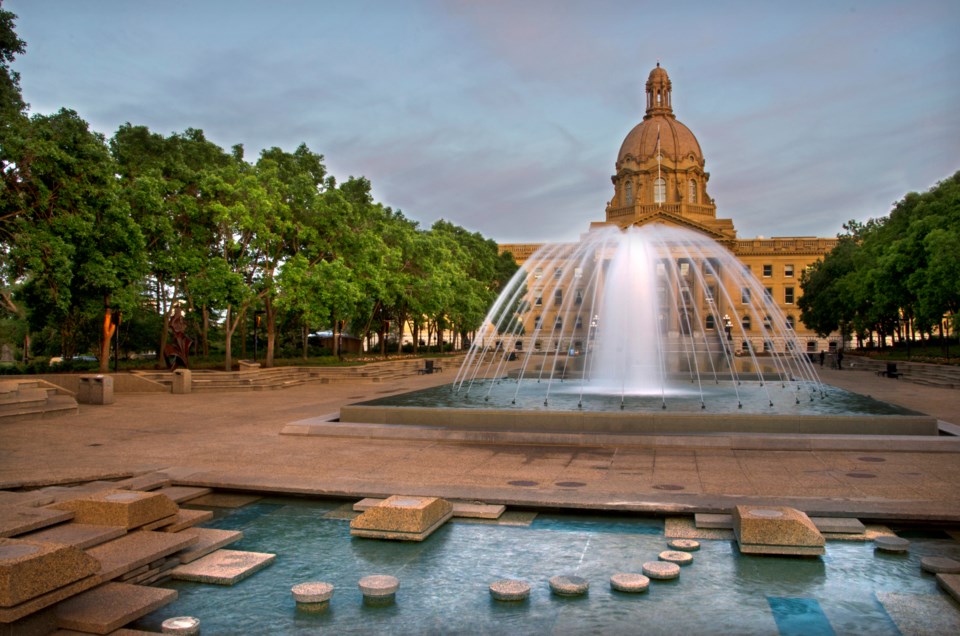Canada’s two westernmost provinces are in a unique moment. For vastly different reasons, the current heads of government of British Columbia and Alberta will step aside in the next few weeks and give way to new governing party leaders who will serve, at least for a few months, as premiers.
Last month, . We put similar questions to Albertans and found a province where people are more likely to outline a wish for independence.
Just under three-in-10 residents (28 per cent, up one point since July 2019) say they are “Albertans first and Canadians second.” This is six points higher than the way British Columbians described themselves.
The people who are more likely to put Alberta ahead of Canada are those aged 55 and over (32 per cent) and those who do not reside in the Calgary or Edmonton metropolitan areas (36 per cent). The biggest difference is political. While only 17 per cent of Albertans who voted for the provincial New Democratic Party (NDP) in the 2019 election consider themselves “Albertans first,” the proportion rises to 45 per cent among those who cast ballots for the United Conservative Party (UCP).
The UCP leadership campaign has revolved, at least temporarily, around the possibility of Alberta establishing a new kind of relationship with Canada. True sovereignty is not particularly high in the minds of residents.
Just over one in five Albertans voice support for two ideas: Alberta joining the United States (21 per cent) and Alberta becoming a country independent of Canada (23 per cent). In stark contrast with what was observed in Quebec in the past decade, the younger generations are more open to the notion of outright independence (25 per cent among both Albertans aged 18 to 34 and aged 35 to 54).
Support for some kind of sovereignty climbs slightly when the idea of an independent country featuring Alberta and Saskatchewan is introduced (24 per cent). The number remains the same when residents are asked to ponder a nation that encompasses Alberta Saskatchewan and Manitoba (24 per cent). When British Columbia is added to the mix, the establishment of an independent country with all four western provinces garners the backing of 30 per cent of Albertans.
A fully independent Western Canada starting at Manitoba’s border with Ontario and reaching the Pacific Ocean is a good idea for 26 per cent of Calgarians, 28 per cent of Edmontonians and 38 per cent of Albertans who live in other areas of the province.
UCP voters, who are more likely to say they are “Albertans first,” are particularly enthralled with the notion of an independent country in all the forms tested, from 34 per cent on its own, to 37 per cent with Saskatchewan, the same 34 per cent with Saskatchewan and Manitoba, and to 43 per cent with British Columbia. The dream of not having to deal with Ottawa again grows, if the proposed nation is larger and has access to the sea.
The numbers are significantly lower among NDP voters. Fewer than one in five support Albertan independence on its own (11 per cent), with Saskatchewan (12 per cent), with Saskatchewan and Manitoba (14 per cent) and with Saskatchewan, Manitoba and British Columbia (17 per cent). It is not a surprise to see UCP leadership candidates keeping this issue alive. The base appears ready to welcome some form of sovereignty.
We also asked Albertans about the last eight premiers. One key difference with British Columbia lies in the level of undecided participants, both when assessing cherished (24 per cent) and disliked (18 per cent) recent heads of government.
Ralph Klein remains the undisputed leader, with more than a third of Albertans (37 per cent, down seven points since July 2019) saying he has been the best premier since November 1985. Rachel Notley is second with 20 per cent (up three points). All the other politicians who headed the provincial government are in the mid-to-low single digits.
When asked about the worst recent premier, two in five Albertans (40 per cent, up 37 points) select Jason Kenney, with Notley (19 per cent, down seven points) and Alison Redford (12 per cent, down 13 points) in double digits. Criticism of Kenney’s tenure is remarkably consistent among age groups and includes 20 per cent of those who voted for the UCP he led in the last provincial election.
Finally, we asked Albertans about what their decision would be if they had to move out of the province but still within Canada. Half of respondents (50 per cent) say British Columbia would be their preferred destination, followed by Saskatchewan (11 per cent), Ontario (10 per cent) and Nova Scotia (four per cent).
Again, the generation gap is pronounced. Majorities of Albertans aged 18 to 34 (54 per cent) and aged 35 to 54 (55 per cent) would head west to British Columbia, but only 41 per cent of those aged 55 and over would join them.
Mario Canseco is president of Research Co.
Results are based on an online study conducted from August 21 to August 23, 2022, among 700 adults in Alberta. The data has been statistically weighted according to Canadian census figures for age, gender and region in British Columbia. The margin of error – which measures sample variability – is plus or minus 3.7 percentage points, 19 times out of 20.





